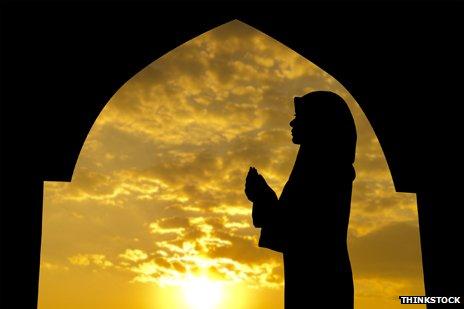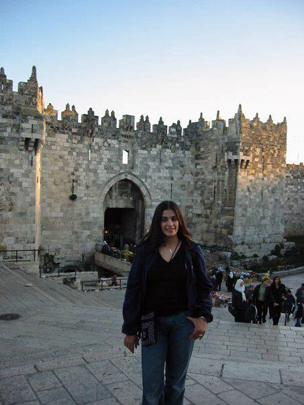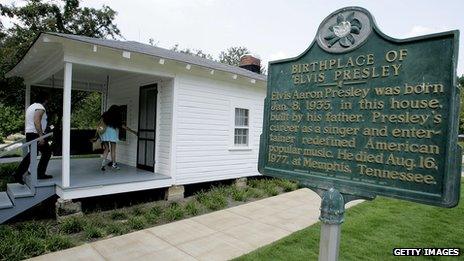Ramadan: Why I gave up on fasting
- Published
- comments

The American comedian and actor with cerebral palsy has always chosen to fast during Ramadan, even though the Koran excuses her due to her disability. This year, however, she has had to admit defeat.
On 10 July, my days of fasting for Ramadan came to an end. One of my cerebral palsy symptoms is that I shake all the time, just like Shakira's hips. It was the first day of the holy month 2013 and, frustratingly, that shaking was finally getting the better of me.
By noon, I no longer had the coordination to tweet and by the time I prematurely broke my fast at 20:00 I could barely breathe. I knew I had fasted my last.
Even though I didn't need to, I'd been fasting during Ramadan for three decades.
I was born and raised in the United States. I spent my school days in New Jersey and my summers in the West Bank.
The first Ramadan on which I fasted was no joke. I was eight and on summer vacation in my parent's village. The Middle East is a sauna at this time of year, making it particularly difficult to observe the Ramadan fast which involves abstaining from food, beverages, smoking and sex.
Despite the challenge, I have never had an issue with fasting - I'm one of those crazy Muslims who really loves Ramadan. Having cerebral palsy means that, technically, I am exempt from fasting even though it is one of the five pillars of Islam and extremely important to the faith.
The Koran states clearly in Surah 2, Ayah 185 that those who have medical conditions are pardoned. So when I chose to fast, I was treated like a champ - my family was over the moon.
I refused to show any weakness because I knew that by fasting against the odds I had been born with, I'd totally get into heaven and more importantly, would get amazing gifts for Eid, the three days of celebration which mark the end of 30 days of Ramadan fasting.
Regardless of the heat, it's fun to abstain when you're in a country where the majority of folks around you are also fasting. It's not as much fun in the US when you are in the minority.
In my school days, American teachers weren't as culturally savvy as they are now. Some genuinely feared for my life and were convinced that I was being forced to fast by my horrible parents. They would try to slip me a butterscotch candy at lunchtime. I would shove it away and tell them I could eat whatever I wanted at sunset, thank you very much.

In Jerusalem: Fasting is easier in company
Every Ramadan, without fail, my mother has told me I don't need to fast if I can't. Those who cannot do it make a donation that will feed a hungry person for the duration of the holy month. and if you can't afford to, you should perform any acts of charity within your capability instead.
My mother has donated on my behalf every year, even though I've fasted, just in case it ever got to be too much and I had to give up. How is that for faith?
My most challenging Ramadan came in the form of a 10-day road trip in 2011, in America's deep south on a comedy tour called The Muslims Are Coming. Ramadan - which moves back 10 days each year - had landed in August. I was performing nightly as well as filming on the streets during the heat of the day.
For the first time in my history of Ramadan, I complained. I was hot, thirsty and tired. Some nights I wasn't breaking my fast until 22:30, but I survived.
The first time I ever had to abandon my daylight fasting was on another tour.
We were at Elvis's house in Tupelo, Mississippi. The statue of The King started to speak to me. I was getting delirious and I realised that if I didn't drink water soon, I'd be as dead as The King himself. And I did not want to die where Elvis was born.

It's OK to miss a day or five, if you are sick, or travelling, or are on your "ladies' holiday". You then have a whole year to make it up. Some Muslims are slick about it and balance up their fast deficit in the dark month of December when the sun sets at 16:00 - this means they only have to fast for six or seven hours. Presently Ramadan is hovering around the months with the longest days in the northern hemisphere.
And so back to this Ramadan. The day after bringing my Ramadan fasts to an end, during daylight hours I reluctantly drank some water.
It felt a bit like drinking poison. It didn't seem right that I was quenching my thirst. I associate Ramadan with some of the happiest days of my life and it felt like a tradition had been lost.
I'm not ashamed that I cannot fast, but I know many people with disabilities or illnesses who do feel the shame.
My newest mission is to remind those who can't fast that there is no reason to put themselves at risk. Muslims fast so they can suffer a little. It is important not to die in the process. If you channel your devotion into charity, this will not only help you stay healthy, it will also help someone who is genuinely suffering.
You can follow Ouch on Twitter, external and on Facebook, external